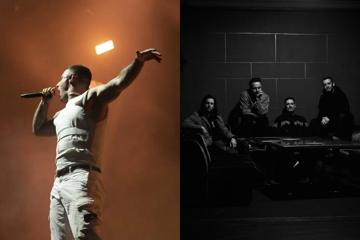Making A Name

As he bubbled up through the blogosphere in 2011, Melburnian beatmaker Chet Faker was known only by his big beard, but offered no real revelations. It was a case of semi-anonymity for the local bro-made-good on the back of his inspired cover of Blackstreet's killer 1996 new jack swing jam No Diggity.
“I'm a bit old-school in my way of thinking, sometimes,” says said Chet Faker. “Because people see music as such a personal thing, when you sell your music, these days, you're actually selling a personality; you're selling yourself. I think, because of that, a lot of musicians get confused and think that because a lot of people like their music it means a lot of people like them. That's not the case, and I don't want to ever think that way myself.”
Thus, Chet Faker is Chet Faker. Except he's also Nick Murphy, a 23-year-old with a hometown history, here, playing solo acousticky jams as Atlas Murphy and in the questionable rock'n'roll band Sunday Kicks. Who plays shows as Chet Faker, now. And tweets. And handles promotional conversations.
“I'm not completely devoted to anonymity: obviously I'm doing this interview with you right now,” Murphy offers. “But I prefer to keep my head down and focus on the music; I'm in no rush to let everyone know everything about me. I don't want to put my personal life at the forefront of my music.”
Don't miss a beat with our FREE daily newsletter
The release of the debut Chet Faker record, Thinking In Textures, means that the music is very publicly out there; but, in turn, the songs shed a light back on their creator. “They're all personal experiences,” Murphy says, of said songs, “there is a lot of information about me in every song. I'm not going out of my way to let everyone know, but I'm not trying to hold back either; in interviews, if people pose those questions, I'll answer them.”
Of course, answering questions, Murphy is more philosophical than confessional. “[My songs are] about all these different situations, but about my mental reaction to those situations,” he offers, “[like] my initial negative reactions to something, then me convincing myself I should be thinking or feeling a different way. Often I can't think that clearly in my own head, but when I put thoughts through music it makes things a lot clear to me.”
What does Murphy mean that he can't think clearly? “You can get stuck in your own head,” Murphy offers. “Everyone thinks a certain way, and sometimes problems that pop up in your head can be solved just by thinking. But when you're putting it down in a song, you're putting it through a different process, and so, as a result, you start to think about these things in a different light, and it can be really elucidating.”
Further elucidation for those seeking the man behind the jams: Murphy began making music as a 15-year-old; first on the piano at his grandparents' house, then by picking up guitar, then, soon after, on cracked computer software. It was a sudden rush from never playing music to playing it nearly all the time. “Fifteen years old is the perfect time to start,” eulogises Murphy. “That's right when you're beginning to realise that the world isn't fair, and you've suddenly got this inner turmoil. And because you've got all this energy and these thoughts you need to find an outlet. I just fell upon music.”
Over time, Murphy would flip-flop between modes of music-making, from focusing on beatmaking to devoting himself to making earnest acoustic tunes. He'd play out with Sunday Kicks or, occasionally, as Atlas Murphy; but electronic music was always something he'd do at home, or in file-swapping collaboration with friends, never a performative thing. “I was swapping between them so much over time; I suppose it was inevitable that I'd eventually meld those two parts together,” Murphy shrugs.
Thus, Chet Faker, where Murphy's smooth croon and fondness for analogue keyboards is set against beats cut like head-noddin' hip hop, delivered with an earnestness that has James Blake a routine fallback for comparisons. It's a sound that's earned him countless online clicks, starting with that cover of No Diggity. “I got home after a late night, and I'd had way too many Red Bulls so I wasn't going to sleep,” begins Murphy, telling a genesis story that feels well-rehearsed already. “So I was working on this beat. I finished the whole instrumental really quickly, and it was always going to be an original song. I'd never thought of doing someone else's song; I was never a huge fan of doing covers. But I was trying to do a vocal and it just wasn't working. No Diggity was stuck in my head – I'd heard it out at the bar that night – so I just sung that over the top, and finally went to bed.”
Listening the next day, Murphy “was defeated by the fact that it would have to be a cover.” Defeated? “Not defeated,” he clarifies, “I was happy to leave it that way, it sounded great, but all of a sudden I had this song that was mine become this song that was someone else's. It's pretty funny: it could've very easily been an original song, and maybe things would've been totally different.”
Though he'd been working in a Chet Faker style in the months leading up to that fated eve, this pseudo-cover felt like the first time Murphy had “comfortably got the style [he] was trying to get”, so, it being 2011, he put it online, first on YouTube, back last February. By June it was all over blogs, inching up the Hype Machine charts. “That's when I started getting all these emails,” Murphy recalls, “and when I had to start thinking about getting a live show together.”
“It was a very tense time. I'd wake up in the morning with software patching ideas running through my head. I found it hard to concentrate on anything else...This project was never designed to be done live; it was only ever supposed to be a bedroom/studio project. I never anticipated that I'd be playing Chet Faker shows with a whole band, but here I am.”








